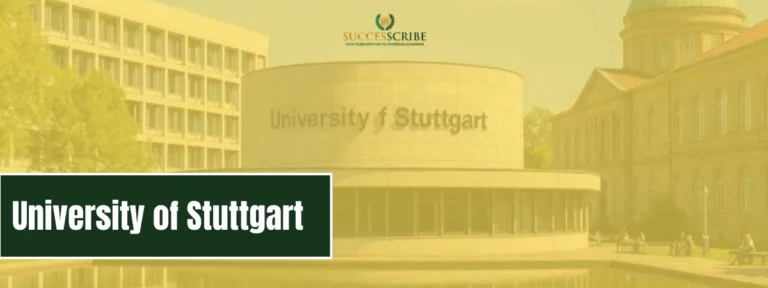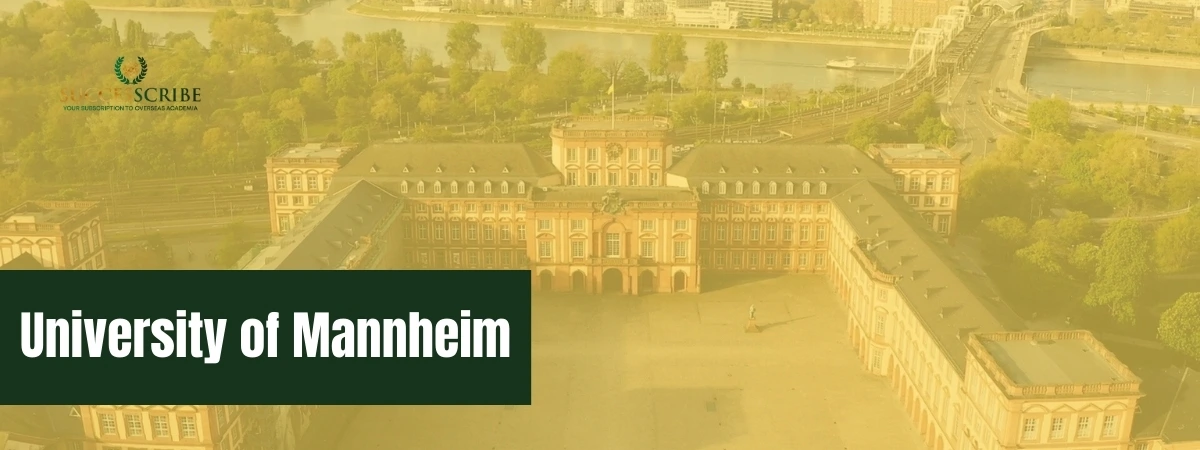Germany continues to be a top-tier destination for international post-graduate students, especially Indian nationals, thanks to its excellent education, strategic job market, and comparatively low cost. In 2026, it hosts over 49,000 Indian students, making it the largest expatriate student community there. The total cost of Masters in Germany is not just about tuition, it’s about opportunity, value, and long-term return on investment.
Key highlights:
- Public universities generally charge no tuition fees for Master’s programs.
- A semester contribution of €100–400 covers administrative costs and travel.
- Living expenses average between €850–1,400 per month, varying by city.
- A blocked account with €11,900/year is mandatory as visa proof
- Health insurance, visa, travel, and miscellaneous costs must be budgeted.
This guide offers an in-depth breakdown of each aspect to help Indian students plan confidently and cost-effectively.
University & Tuition Fees
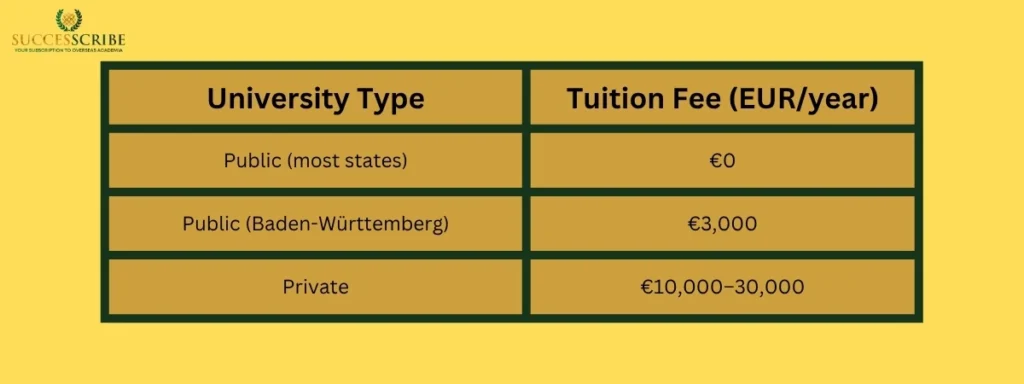
One of the most significant advantages of pursuing a Master’s degree in Germany is the low or no tuition fee structure, especially at public universities. However, depending on the type of university (public or private), the state regulations, and your course type, there can be some cost implications. When calculating the total cost of Masters in Germany, understanding the difference between public and private university tuition fees is crucial.
| University Type | Tuition Fee (EUR/year) | Semester Contribution (EUR/year) | Total (EUR/year) |
| Public (most states) | €0 | €200–€700 | €200–€700 |
| Public (Baden-Württemberg) | €3,000 | €200–€350 | €3,200–€3,350 |
| Private | €10,000–30,000 | €0–300 | €10,000–30,300 |
Apply to Top German Universities
Make your application simple and stress-free with Successcribe
Get Expert Help NowLet’s explore each type in detail
Public Universities in Germany
Germany is home to over 300 public universities, many of which are globally ranked (such as TU Munich, LMU Munich, University of Heidelberg, and RWTH Aachen). These universities are funded by the government, and they offer tuition-free or very low-cost education to both domestic and international students—including Indian students.
Tuition Fee Structure:
- Consecutive Master’s Programs (i.e., directly following a Bachelor’s degree in the same field):
No tuition fee at most public universities.
- Non-consecutive Master’s Programs (i.e., specialized or executive programs, often requiring work experience):
Can cost €2,000–€10,000 per semester, depending on the program.
Note: The majority of Indian students apply for consecutive Master’s programs, which are largely tuition-free.
State-wise Tuition Policies
| State | Tuition Fee for Non-EU Students | Semester Contribution | Examples of Universities |
| Baden-Württemberg | €1,500 per semester | €150–350 | University of Stuttgart, University of Freiburg |
| Bavaria | Some universities charge €2,000/year | €100–200 | TUM, LMU Munich (partial tuition for non-EU) |
| North Rhine-Westphalia (NRW) | No tuition fee | €250–350 | RWTH Aachen, University of Cologne |
| Berlin | No tuition fee | €250–315 | TU Berlin, FU Berlin |
| Hesse | No tuition fee | €270–320 | TU Darmstadt, Goethe University Frankfurt |
| Saxony | No tuition fee | €250–300 | University of Leipzig, TU Dresden |
Semester Contribution
Even though tuition is free, students are required to pay a semester contribution (Semesterbeitrag) which covers:
- Administrative fees
- Student services
- Public transportation (semester ticket)
Typical range: €100–€400 per semester, or €200–€800 annually
Example Calculation for a Public University:
| Fee Type | Cost (EUR) |
| Tuition Fee | €0 |
| Semester Contribution | €600 (annual) |
| Total | €600/year |
For most Indian students, the Germany masters fees for Indian students at public universities is extremely affordable, especially compared to countries like the US, UK, or Australia.
Private Universities in Germany
While most students choose public universities due to the affordability, Germany also has over 100 private universities, offering specialized and English-taught programs, particularly in:
- Business Administration (e.g., MBA)
- Engineering
- Data Science
- International Relations
- Finance & Marketing
These universities are not state-funded, so they charge tuition fees for all their programs, both Bachelor’s and Master’s.
Fee Structure in Private Universities
| University | Program | Tuition Fee (EUR/year) |
| Frankfurt School of Finance & Management | MSc in Finance, MSc in Management, MBA | €22,000 – €26,500 |
| HHL Leipzig Graduate School of Management | MSc in Management, MBA | €19,500 – €29,500 (entire program) |
| WHU – Otto Beisheim School of Management | MSc in Management, Finance, MBA | €15,000 – €23,000/year |
These are average estimates. Actual fees vary based on specialization and duration.
What do these tuition fees include?
- Teaching and assessment
- Course materials (sometimes)
- Access to libraries, online platforms, and tech tools
- Some universities may include internship placements
Example Calculation for a Private University
| Fee Type | Cost (EUR) |
| Tuition Fee | €12,000/year |
| Semester Contribution | €0–€300 |
| Total | €12,300/year |
The masters in Germany for Indian students cost is significantly higher at private universities. However, they may offer more flexible admission, English-taught programs, and international business exposure.
What Indian Students Should Know
Public universities are highly recommended if you’re budget-conscious.
- Germany masters fees for Indian students at public universities is less than 1/10th the cost compared to the USA or UK.
- In states like Baden-Württemberg, Indian students must pay additional tuition fees, budget accordingly.
- Private universities offer a wider variety of English-taught programs, but are significantly more expensive.
- Check whether the Master’s is consecutive (more affordable) or non-consecutive (costlier).
- Some public universities have started charging “tuition-light” models for non-EU students; always check university websites for the latest fee updates.
Suggested Post: Entrance exam for masters in Germany
Want to Study in Germany?
Start your journey with Successcribe’s free expert guidance
Book a Free Session NowLiving Costs in Germany for Master’s Students (Accommodation, Food, Transport, Utilities)
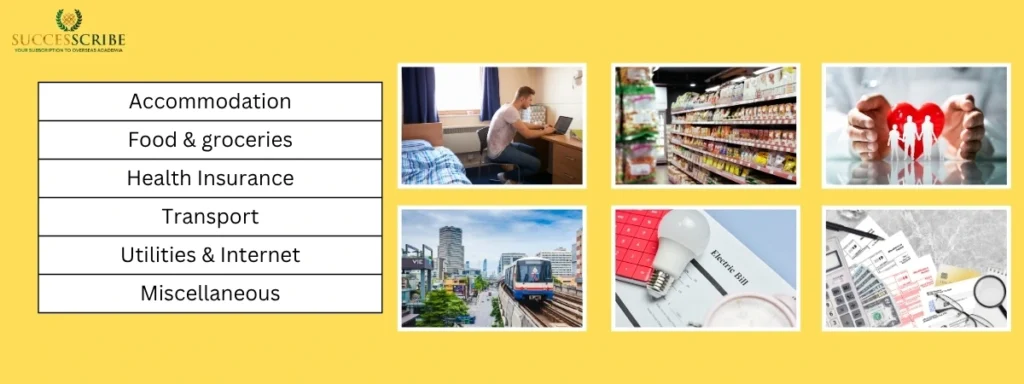
Even when accounting for blocked accounts, living costs, and health insurance, the total cost of Masters in Germany remains one of the lowest in Europe. When estimating the total cost of studying in Germany, one of the most significant components is the monthly living expenses. While tuition at public universities is minimal or even zero, living costs typically range between €850 to €1,400 per month, depending on your city, lifestyle, and housing situation.
This section explores key expenses:
- Accommodation
- Food & groceries
- Transportation
- Utilities & Internet
- Miscellaneous expenses
1. Average Monthly Living Expenses
| Expense Category | Monthly Cost (EUR) |
| Accommodation (rent) | €300 – €700 |
| Food & groceries | €150 – €300 |
| Health insurance | €80 – €120 |
| Transportation | €30 – €100 |
| Utilities & internet | €50 – €100 |
| Miscellaneous/personal | €100 – €250 |
| Total (approx.) | €850 – €1,400 |
Students living in university dorms or smaller towns may spend on the lower end. Those living alone in cities like Munich, Hamburg, or Frankfurt may spend on the higher side. Accommodation and everyday expenses form a significant part of the total cost of Masters in Germany, often ranging between €850 and €1,400 per month.
2. Accommodation: The Biggest Expense
Accommodation is usually the largest part of a student’s living budget. Housing options include:
Housing Types & Costs
| Type | Monthly Rent (EUR) | Pros | Cons |
| Student Dormitories | €200 – €400 | Affordable, social | Limited availability, shared facilities |
| Shared Flat (WG – Wohngemeinschaft) | €300 – €600 | More privacy, independence | Needs separate contracts, utility sharing |
| Private Apartment | €500 – €1,200 | Total privacy | Expensive, utilities not included |
Initial Move-In Costs
- Security Deposit: 2–3 months’ rent (refundable)
- Furniture/Setup: €200–500 if unfurnished
- Registration Fee: €10–30 at Bürgeramt (city registration office)
Tip: Many Indian students prefer WGs (shared flats) or student hostels through Studentenwerk (student services).
3. Food & Groceries
Germans usually cook at home, and so do most international students. Monthly grocery and food costs can be kept affordable with planning.
| Food Expense Type | Estimated Cost (EUR/month) | Notes |
| Groceries (Aldi, Lidl, Rewe) | €100 – €200 | Affordable when cooking at home |
| Eating out (student meals) | €30 – €80 | University canteens cost €2–5 per meal |
| Occasional restaurant meals | €20 – €50 | One meal out: €10–15 |
Tip: Indian groceries and spices are available in big cities like Berlin, Frankfurt, Munich, and Cologne. However, they may cost 2x–3x compared to Indian prices.
4. Transportation
Most students in Germany use public transportation—trains, buses, trams, and metros.
Semester Ticket
Included in your semester contribution (Semesterbeitrag), a semester ticket offers:
- Unlimited travel within the city/region
- Often valid for 6 months
- Saves €60–100/month in transportation
Monthly Travel Pass (if semester ticket not included)
| City | Monthly Pass (EUR) |
| Munich | €66 |
| Berlin | €49 (Deutschlandticket) |
| Frankfurt | €60–€80 |
| Leipzig | €30–€50 |
Free with Semester Ticket: In most public universities, the semester fee includes public transport. Check your university’s website.
5. Utilities & Internet
If you’re living in a shared flat or private apartment, utilities are usually not included in the rent. For dorms, these are typically covered.
Monthly Utility Costs
| Utility Type | Monthly Cost (EUR) | Comments |
| Electricity | €30–€60 | Depends on usage & flatmates |
| Heating & Water | €20–€50 | Higher in winter |
| Internet & Mobile | €20–€30 | DSL Wi-Fi, plus prepaid/postpaid SIMs |
Opt for flat-rate SIMs like Lycamobile, Vodafone CallYa, or O2 prepaid which offer €10–€20/month unlimited plans.
Annual Living Cost Summary
| Expense Type | Annual Estimate (EUR) |
| Accommodation | €4,800 – €8,400 |
| Food & groceries | €1,800 – €3,600 |
| Health Insurance | €960 – €1,440 |
| Transport | €360 – €1,200 |
| Utilities & Internet | €600 – €1,200 |
| Miscellaneous | €1,000 – €2,000 |
| Total Annual Cost | €9,520 – €17,840 |
APS Cost for Germany
APS (Akademische Prüfstelle) is a joint initiative of the German Embassy in India and the German Academic Exchange Service (DAAD).
Its primary purpose is to verify your academic documents and validate your qualifications before you apply for a student visa to Germany.
APS Fee
- The APS certificate fee is ₹18,000 (as of 2026)
- Paid via bank transfer to the account provided on the APS India website
How APS Fits Into the Visa Timeline
| Step 1 | What You Do | When |
| 1 | Apply for APS certification | After getting provisional admission or during application |
| 2 | Receive APS certificate (hard copy) | 3–4 weeks |
| 3 | Book your German student visa appointment | Only after you receive APS |
| 4 | Apply for Visa with APS + Blocked Account + Admission Letter | 4–6 weeks before intended travel |
Suggested Post: German language scope in India
Blocked Account total cost of Masters in Germany
Before arriving in Germany, international students, especially those from India, must demonstrate financial stability to cover their living expenses. This is primarily done through a Blocked Account and by obtaining a German Student Visa.
This section explains:
What a blocked account is:
- 2026 updated minimum deposit
- Approved providers
- Visa fees & residence permit details
- Documents required
- Cost summary
Blocked Account: What & Why?
The Blocked Account (Sperrkonto) is a special bank account that serves as proof of sufficient financial means to support yourself during your stay in Germany.
As per the German Federal Foreign Office (2026), the minimum required amount for a blocked account is:
- €11,904 per year
- That’s €992/month × 12 months
This amount ensures that you can cover your living costs in Germany without needing external financial help.
Why blocked?
- You cannot withdraw the full amount at once
- You can only access a fixed monthly sum (currently €992/month in 2026)
How Much Do You Need to Deposit in 2026?
As of 2026, the minimum annual deposit for a blocked account has been increased to match inflation and higher living costs:
| Criteria | 2026 Requirement |
| Monthly withdrawal limit | €992 |
| Annual required deposit | €11,904 |
| Currency in INR (approx.) | ₹11,90,000 |
Some authorities may ask for €13,092/year under the Chancenkarte residence permit or other pathways. For regular student visas, €11,904 is widely accepted.\
Approved Blocked Account Providers
Germany only accepts blocked accounts opened through approved providers. Below is a comparison of the most popular blocked account services for Indian students:
| Provider | Account Setup Fee | Annual Charges | Special Features |
| Expatrio | €49 | €5/month | Combo with health insurance, fast processing |
| Fintiba | €89 | €4.90/month | Partnered with Sutor Bank, app-based tracking |
| Coracle | €99 | Included | Free setup for some Indian banks |
| Deutsche Bank | Varies | None | Traditional bank; in-person application |
| ICICI Bank Germany | €0 | Limited access | Requires ICICI relationship in India |
Most Indian students opt for Fintiba or Expatrio due to ease of setup, digital onboarding, and combo health insurance packages.
Documents Required for Opening a Blocked Account
To open a blocked account, you usually need:
- Valid passport
- Admission letter from a German university
- Proof of residence (can be temporary)
- PAN card (sometimes)
- Passport-size photos
- Proof of funds (bank statement in India, if applicable)
What Happens to the Money?
- Upon arrival in Germany, you receive access to the monthly amount (e.g., €992).
- This covers rent, food, transportation, and other expenses.
- If you leave or cancel your studies, unused funds are refunded back to your Indian account
Suggested Post: IELTS score for German public universities
Student Visa cost and Process for Indian Students
To legally enter and study in Germany, Indian students must apply for a National Visa (Type D), also known as a Student Visa.
Visa Fees & Associated Costs
| Fee Type | Cost (EUR) | Cost (INR) | Notes |
| Student Visa Fee | €75 | ₹7,500 | Paid during VFS/Embassy appointment |
| Residence Permit (in Germany) | €100 – €110 | ₹10,000 – ₹11,199 | Payable after arrival |
| Travel Health Insurance | €30 – €90 | ₹3,000 – ₹9,000 | For initial 3 months (some get it free with Expatrio/Fintiba) |
| Biometric Charges (India) | ₹600 – ₹1,200 | Payable at VFS India | |
| Document Courier/Printing | ₹500 – ₹1,000 | Optional, but common | |
| Flight Ticket (One-way) | €400 – €900 | ₹40,000 – ₹90,000 | Depending on time of booking |
Steps for Student Visa Application
| Step | Details |
| Book an appointment | VFS or German Consulate (Mumbai, Delhi, Kolkata, etc.) |
| Fill application form | Online or paper form (VIDEX) |
| Submit Documents | At visa center (see below) |
| Attend interview | Focus on purpose, funding , course awareness |
| Wait for approval | Typically 4 – 10 weeks |
| Get passport stamped | Visa Validity: 90 – 180 days |
| Apply for a resident permit | After arriving in Germany |
Visa Requirements
| Requirement | Details |
| Valid Passport | Min. 12 months validity |
| Admission Letter | From a recognized German university |
| Blocked Account Proof | Minimum €11,904/year |
| APS Certificate | Document Verification |
| Academic Transcripts | Class 10, 12, and Bachelor’s marksheets |
| Language Proficiency | IELTS/TOEFL or proof of English-taught degree |
| Visa Application Form | Filled + signed |
| Passport Photos | Biometric |
| Travel Health Insurance | Min. 3 months (included in some blocked account packages) |
Suggested Post: Jobs after masters in Germany
Hidden Costs of Studying Master’s in Germany (2026)
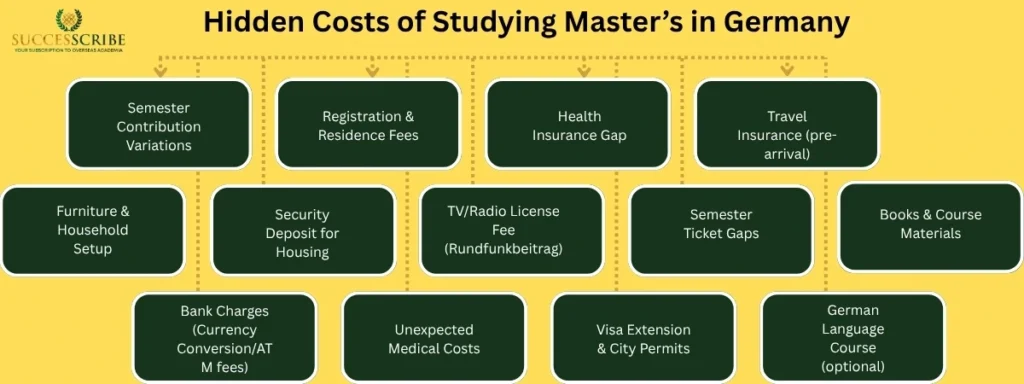
While tuition fees and basic living expenses are widely discussed, there are several hidden or indirect costs that students often forget to budget for. These costs, if not anticipated, can lead to financial stress once you are already in Germany. Many students overlook indirect charges like radio fees and furniture setup, but these hidden costs quietly add to the total cost of Masters in Germany.
Here’s a breakdown of potential hidden costs every Indian student should be aware of when planning to study for a Master’s in Germany:
| Cost Category | Estimated Amount (EUR) | Details |
| Semester Contribution Variations | €100 – €400 per semester | Not tuition, but mandatory and varies by university; covers admin & transport |
| Registration & Residence Fees | €10 – €50 | One-time registration at the Bürgeramt (city registration office) |
| Health Insurance Gap | €30 – €90 | Initial months if not covered by blocked account package |
| Travel Insurance (pre-arrival) | €30 – €80 | Required for visa until health insurance starts |
| Furniture & Household Setup | €200 – €700 | If your accommodation is unfurnished (bed, table, kitchen items, etc.) |
| Security Deposit for Housing | 2–3 months’ rent | Refundable, but must be paid upfront |
| TV/Radio License Fee (Rundfunkbeitrag) | €18.36/month | Mandatory for every household, even if you don’t watch TV |
| Semester Ticket Gaps | €30 – €100/month | If your university doesn’t offer a semester ticket |
| Books & Course Materials | €100 – €300/year | Sometimes not included in tuition |
| Bank Charges (Currency Conversion/ATM fees) | €50 – €150/year | Fees for transferring money from India or using international cards |
| Unexpected Medical Costs | €50 – €200 | If not fully covered under insurance |
| Visa Extension & City Permits | €100 – €110 | After arrival if you extend or update residence status |
| German Language Course (optional) | €300 – €1,000 | If you decide to improve your German locally |
Suggested Post: Part time jobs in Germany for students
Scholarships & Financial Aid Options for Indian Students
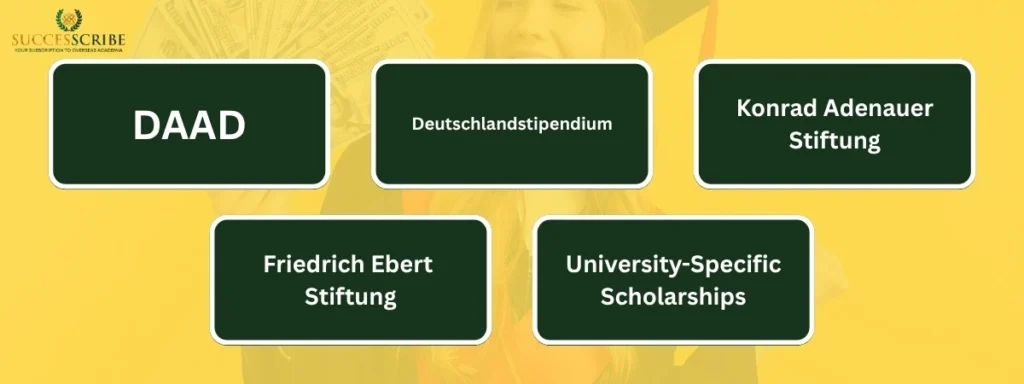
Germany offers a wide range of scholarships for international students, especially through public universities, foundations, and government-backed organizations.
| Scholarship Name | Coverage | Eligible Courses | Indian Eligibility |
| DAAD | Full tuition + €934/month stipend | Development-related Master’s | Yes |
| Deutschlandstipendium | €300/month | All disciplines | Yes |
| Konrad Adenauer Stiftung | €850/month + travel | Political Science, Law, Social Sciences | Yes |
| Friedrich Ebert Stiftung | €850/month + fees | All fields | Yes |
| University-Specific Scholarships | Partial tuition & cost subsidy | Varies | Yes |
Suggested Post: Average salary after masters in Germany
Part-Time Work Opportunities for Students
International students can legally work while studying in Germany to support themselves financially.
Work Regulations:
- Up to 120 full days or 240 half days per year.
- Students can earn €10–€15/hour, depending on job type and city.
- Common jobs: Library assistant, café staff, delivery personnel, student tutor, research assistant.
Income & Tax Info:
- Annual tax-free income limit: €6,240/year.
- Above this limit, income is taxed at basic German rates.
Post-Study Work Opportunities & ROI
Germany offers excellent post-graduation work options, helping students recover their education investment.
Key Points:
- After graduation, students can apply for a Job-Seeking Visa (18-month validity).
- Once employed full-time, graduates can apply for a residence permit or EU Blue Card.
Average Starting Salaries
| Field | Starting Salary (€/year) |
| Computer Science | €50,000 – €65,000 |
| Engineering | €48,000 – €60,000 |
| Finance & Business | €45,000 – €55,000 |
| Life Sciences | €42,000 – €50,000 |
Long-term Residency:
- Eligible for PR after 2 years of full-time work.
- Excellent ROI compared to US/UK due to low upfront costs.
Conclusion
The total cost of Masters in Germany is often calculated in euros, spreadsheets, and living budgets. But for Indian students with dreams bigger than borders, it’s so much more. It’s the cost of ambition rewarded by tuition-free education. It’s the value of learning in globally ranked institutions without a lifelong debt. It’s the price of preparation that opens doors to world-class careers, cross-cultural experiences, and permanent global mobility.
In a world where education often comes with a heavy financial toll, Germany flips the narrative. The total cost for Masters in Germany becomes a gateway to opportunity, not a barrier. And for Indian students ready to chart their global path, it just might be the smartest investment you’ll ever make.
FAQs
What is the total cost for Masters in Germany for Indian students in 2026?
The total cost for Masters in Germany ranges between €10,000 and €18,000 per year, depending on your university (public or private), city of residence, and lifestyle. This includes semester contributions, living expenses, health insurance, and a blocked account.
Are tuition fees really free at public universities in Germany?
Yes! Most public universities in Germany charge no tuition fees for consecutive Master’s programs. However, you still need to pay a semester contribution (around €200–€400 per semester), which covers administrative costs and transport.
Do Indian students have to pay any hidden costs apart from tuition and living?
Yes, several indirect costs must be budgeted, including registration fees, TV license (Rundfunkbeitrag), residence permit, housing deposits, and setup expenses. These can add up to €1,000–€2,000 annually.
Is the blocked account amount part of the total cost for Masters in Germany?
Yes. The blocked account is a major component, with €11,904 required for one year (as of 2026). This ensures you have sufficient funds to support yourself and is mandatory for your student visa.
Are private universities in Germany more expensive than public ones?
Absolutely. While public universities charge little to no tuition, private universities can cost between €10,000 and €30,000 per year, depending on the program and institution (e.g., Frankfurt School, WHU, HHL Leipzig).
Related Post
MS in Cloud Computing in Germany
Masters in Robotics in Germany
Masters in Data Science in Germany
Entrance exam for masters in Germany






